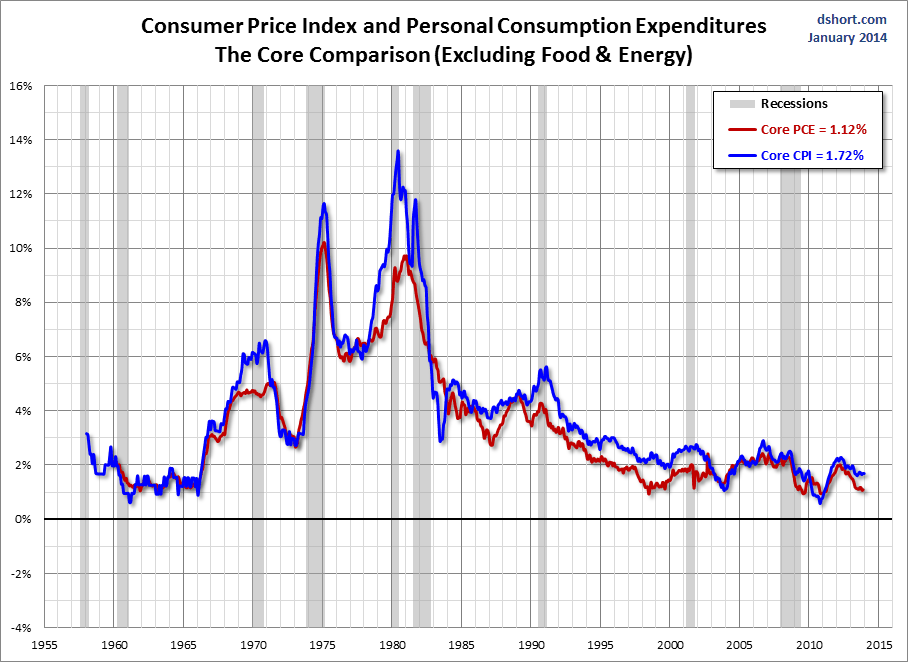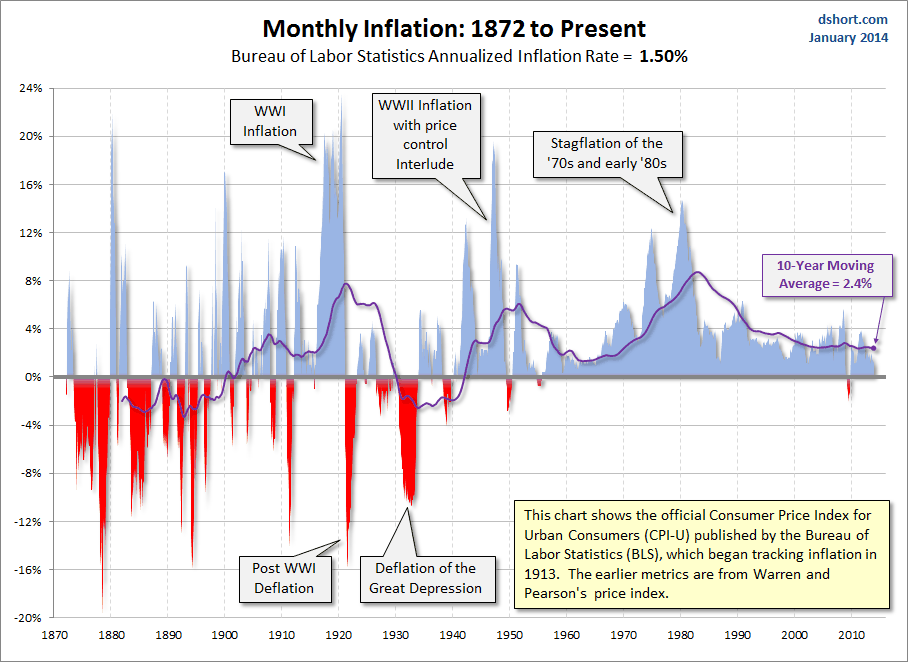I have written a variety of posts concerning "deflationary pressures" and deflation as I continue to believe that deflationary conditions are on the horizon, and that such deflationary conditions will cause, as well as accompany, inordinate economic hardship. [note: to clarify, for purposes of this discussion, when I mention "deflation" I am referring to the CPI going below zero. Also, I have been using the term "deflationary pressures" as a term to describe deflationary manifestations within an environment that is still overall inflationary but heading towards deflation.]
For reference purposes, here is a chart of the Core CPI and Core PCE, as seen in Doug Short's update of January 17, 2014 titled "Two Measures of Inflation: CPI and the PCE Price Index and Fed Policy" :
I consider it highly notable that while various “deflationary pressures” continue to manifest expectations of deflation among various parties and measures remain (almost entirely) nonexistent. For example, one can see in the various professional economic forecasts mentioned in this blog economic forecasters have virtually no expectation of deflation either in the near-term or for the next few years. As well, continually low readings from the Federal Reserve Bank of Atlanta’s series titled “Deflation Probabilities” continue to show negligible possibilities for deflation. Furthermore, businesses don’t appear to have significant concern over deflationary conditions. This can be seen in a variety of measures and surveys, with one being seen in my ProfitabilityIssues.com post of January 15 titled “Businesses’ Forecasts Of Long-Term Inflation And Year-Ahead Unit Sales Growth.” This negligible expectation by businesses concerning deflation – or even a significant lessening of the aggregate price level – seems especially notable given many overt signs of increased discounting and other indications of mounting pricing pressures.
As compared to the above, there does appear to be increased recognition concerning the possibility of deflation internationally. This can be seen in many measures and commentary, such as Haver's January 15 "EMU Inflation Hits the Lower Bound."
There are likely many reasons why there is a pronounced lack of concern over future U.S. deflation. Of course, one obvious reason is that near-term deflation is indeed not going to happen – i.e. the aforementioned widely-held expectations concerning no near-term deflation are indeed correct. Conversely, other reasons may explain why – despite many overt signs of building “deflationary pressures” as well as clear recent downward trends in CPI and other measures – that near-term deflation is not a concern. One of these reasons may well be that incidents of U.S. deflation have been, over the long-term, very infrequent. This pronounced lack of occurrence may have fostered (considerable) complacency. This long-term infrequency can be seen in Doug Short’s long-term CPI chart, as seen in his January 16 update titled "A Long-Term Look at Inflation" :
Another reason – likely correlated to the infrequent (from the long-term perspective) incidents of deflation – is the seemingly (very) widely held belief that the Federal Reserve can prevent deflation. This belief is likely highly buttressed by the above chart – given that since 1913 (when the Federal Reserve was created) both the frequency and magnitude of deflation has noticeably decreased.
Also, because of this relative lack of deflation over the past 100 years, not only may there be (considerable) complacency regarding the possibility of deflation – but there may be a widespread inability to “spot” or “predict” impending deflation. As I mentioned in the November 14 post (“Thoughts Concerning Deflation”):
Given that deflationary episodes have been recently relatively nonexistent, "seeing" and "proving" explicit signs of such an impending condition is especially challenging.
In conclusion, I continue to believe that deflationary conditions are on the horizon. As discussed in the aforementioned November 14 post, deflation often accompanies financial-system distress. My analyses continue to show an exceedingly complex future financial condition in which a very large “financial meltdown” will occur, during which outright deflation will both accompany and exacerbate economic and financial conditions.
_____
The Special Note summarizes my overall thoughts about our economic situation
SPX at 1844.86 as this post is written


No comments:
Post a Comment